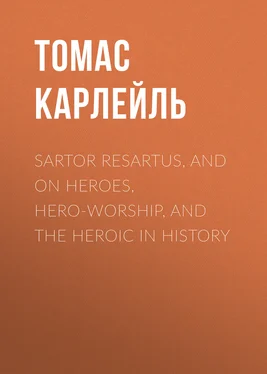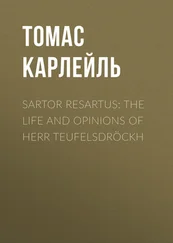Томас Карлейль - Sartor Resartus, and On Heroes, Hero-Worship, and the Heroic in History
Здесь есть возможность читать онлайн «Томас Карлейль - Sartor Resartus, and On Heroes, Hero-Worship, and the Heroic in History» — ознакомительный отрывок электронной книги совершенно бесплатно, а после прочтения отрывка купить полную версию. В некоторых случаях можно слушать аудио, скачать через торрент в формате fb2 и присутствует краткое содержание. Жанр: foreign_prose, literature_19, foreign_antique, на английском языке. Описание произведения, (предисловие) а так же отзывы посетителей доступны на портале библиотеки ЛибКат.
- Название:Sartor Resartus, and On Heroes, Hero-Worship, and the Heroic in History
- Автор:
- Жанр:
- Год:неизвестен
- ISBN:нет данных
- Рейтинг книги:4 / 5. Голосов: 1
-
Избранное:Добавить в избранное
- Отзывы:
-
Ваша оценка:
- 80
- 1
- 2
- 3
- 4
- 5
Sartor Resartus, and On Heroes, Hero-Worship, and the Heroic in History: краткое содержание, описание и аннотация
Предлагаем к чтению аннотацию, описание, краткое содержание или предисловие (зависит от того, что написал сам автор книги «Sartor Resartus, and On Heroes, Hero-Worship, and the Heroic in History»). Если вы не нашли необходимую информацию о книге — напишите в комментариях, мы постараемся отыскать её.
Sartor Resartus, and On Heroes, Hero-Worship, and the Heroic in History — читать онлайн ознакомительный отрывок
Ниже представлен текст книги, разбитый по страницам. Система сохранения места последней прочитанной страницы, позволяет с удобством читать онлайн бесплатно книгу «Sartor Resartus, and On Heroes, Hero-Worship, and the Heroic in History», без необходимости каждый раз заново искать на чём Вы остановились. Поставьте закладку, и сможете в любой момент перейти на страницу, на которой закончили чтение.
Интервал:
Закладка:
‘Such, since the most of us are too ophthalmic, would be the general fate; were it not that one thing saves us: our Hunger. For on this ground, as the prompt nature of Hunger is well known, must a prompt choice be made: hence have we, with wise foresight, Indentures and Apprenticeships for our irrational young; whereby, in due season, the vague universality of a Man shall find himself ready-moulded into a specific Craftsman; and so thenceforth work, with much or with little waste of Capability as it may be; yet not with the worst waste, that of time. Nay even in matters spiritual, since the spiritual artist too is born blind, and does not, like certain other creatures, receive sight in nine days, but far later, sometimes never,—is it not well that there should be what we call Professions, or Bread-studies ( Brodzwecke ), pre-appointed us? Here, circling like the gin-horse, for whom partial or total blindness is no evil, the Bread-artist can travel contentedly round and round, still fancying that it is forward and forward; and realise much: for himself victual; for the world an additional horse’s power in the grand corn-mill or hemp-mill of Economic Society. For me too had such a leading-string been provided; only that it proved a neck-halter, and had nigh throttled me, till I broke it off. Then, in the words of Ancient Pistol, did the world generally become mine oyster, which I, by strength or cunning, was to open, as I would and could. Almost had I deceased ( fast wär ich umgekommen ), so obstinately did it continue shut.’
We see here, significantly foreshadowed, the spirit of much that was to befall our Autobiographer; the historical embodiment of which, as it painfully takes shape in his Life, lies scattered, in dim disastrous details, through this Bag Pisces , and those that follow. A young man of high talent, and high though still temper, like a young mettled colt, ‘breaks-off his neck-halter,’ and bounds forth, from his peculiar manger, into the wide world; which, alas, he finds all rigorously fenced-in. Richest clover-fields tempt his eye; but to him they are forbidden pasture: either pining in progressive starvation, he must stand; or, in mad exasperation, must rush to and fro, leaping against sheer stone-walls, which he cannot leap over, which only lacerate and lame him; till at last, after thousand attempts and endurances, he, as if by miracle, clears his way; not indeed into luxuriant and luxurious clover, yet into a certain bosky wilderness where existence is still possible, and Freedom, though waited on by Scarcity, is not without sweetness. In a word, Teufelsdröckh having thrown-up his legal Profession, finds himself without landmark of outward guidance; whereby his previous want of decided Belief, or inward guidance, is frightfully aggravated. Necessity urges him on; Time will not stop, neither can he, a Son of Time; wild passions without solacement, wild faculties without employment, ever vex and agitate him. He too must enact that stern Monodrama, No Object and no Rest ; must front its successive destinies, work through to its catastrophe, and deduce therefrom what moral he can.
Yet let us be just to him, let us admit that his ‘neck-halter’ sat nowise easy on him; that he was in some degree forced to break it off. If we look at the young man’s civic position, in this Nameless capital, as he emerges from its Nameless University, we can discern well that it was far from enviable. His first Law-Examination he has come through triumphantly; and can even boast that the Examen Rigorosum need not have frightened him: but though he is hereby ‘an Auscultator of respectability,’ what avails it? There is next to no employment to be had. Neither, for a youth without connexions, is the process of Expectation very hopeful in itself; nor for one of his disposition much cheered from without. ‘My fellow Auscultators,’ he says, ‘were Auscultators: they dressed, and digested, and talked articulate words; other vitality showed they almost none. Small speculation in those eyes, that they did glare withal! Sense neither for the high nor for the deep, nor for aught human or divine, save only for the faintest scent of coming Preferment.’ In which words, indicating a total estrangement on the part of Teufelsdröckh, may there not also lurk traces of a bitterness as from wounded vanity? Doubtless these prosaic Auscultators may have sniffed at him, with his strange ways; and tried to hate, and what was much more impossible, to despise him. Friendly communion, in any case, there could not be: already has the young Teufelsdröckh left the other young geese; and swims apart, though as yet uncertain whether he himself is cygnet or gosling.
Perhaps, too, what little employment he had was performed ill, at best unpleasantly. ‘Great practical method and expertness’ he may brag of; but is there not also great practical pride, though deep-hidden, only the deeper-seated? So shy a man can never have been popular. We figure to ourselves, how in those days he may have played strange freaks with his independence, and so forth: do not his own words betoken as much? ‘Like a very young person, I imagined it was with Work alone, and not also with Folly and Sin, in myself and others, that I had been appointed to struggle.’ Be this as it may, his progress from the passive Auscultatorship, towards any active Assessorship, is evidently of the slowest. By degrees, those same established men, once partially inclined to patronise him, seem to withdraw their countenance, and give him up as ‘a man of genius’: against which procedure he, in these Papers, loudly protests. ‘As if,’ says he, ‘the higher did not presuppose the lower; as if he who can fly into heaven, could not also walk post if he resolved on it! But the world is an old woman, and mistakes any gilt farthing for a gold coin; whereby being often cheated, she will thenceforth trust nothing but the common copper.’
How our winged sky-messenger, unaccepted as a terrestrial runner, contrived, in the mean while, to keep himself from flying skyward without return, is not too clear from these Documents. Good old Gretchen seems to have vanished from the scene, perhaps from the Earth; other Horn of Plenty, or even of Parsimony, nowhere flows for him; so that ‘the prompt nature of Hunger being well known,’ we are not without our anxiety. From private Tuition, in never so many languages and sciences, the aid derivable is small; neither, to use his own words, ‘does the young Adventurer hitherto suspect in himself any literary gift; but at best earns bread-and-water wages, by his wide faculty of Translation. Nevertheless,’ continues he, ‘that I subsisted is clear, for you find me even now alive.’ Which fact, however, except upon the principle of our true-hearted, kind old Proverb, that ‘there is always life for a living one,’ we must profess ourselves unable to explain.
Certain Landlords’ Bills, and other economic Documents, bearing the mark of Settlement, indicate that he was not without money; but, like an independent Hearth-holder, if not House-holder, paid his way. Here also occur, among many others, two little mutilated Notes, which perhaps throw light on his condition. The first has now no date, or writer’s name, but a huge Blot; and runs to this effect: ‘The ( Inkblot ), tied-down by previous promise, cannot, except by best wishes, forward the Herr Teufelsdröckh’s views on the Assessorship in question; and sees himself under the cruel necessity of forbearing, for the present, what were otherwise his duty and joy, to assist in opening the career for a man of genius, on whom far higher triumphs are yet waiting.’ The other is on gilt paper; and interests us like a sort of epistolary mummy now dead, yet which once lived and beneficently worked. We give it in the original: ‘ Herr Teufelsdröckh wird von der Frau Gräfinn, auf Donnerstag, zum Æsthetischen Thee schönstens eingeladen. ’
Читать дальшеИнтервал:
Закладка:
Похожие книги на «Sartor Resartus, and On Heroes, Hero-Worship, and the Heroic in History»
Представляем Вашему вниманию похожие книги на «Sartor Resartus, and On Heroes, Hero-Worship, and the Heroic in History» списком для выбора. Мы отобрали схожую по названию и смыслу литературу в надежде предоставить читателям больше вариантов отыскать новые, интересные, ещё непрочитанные произведения.
Обсуждение, отзывы о книге «Sartor Resartus, and On Heroes, Hero-Worship, and the Heroic in History» и просто собственные мнения читателей. Оставьте ваши комментарии, напишите, что Вы думаете о произведении, его смысле или главных героях. Укажите что конкретно понравилось, а что нет, и почему Вы так считаете.












